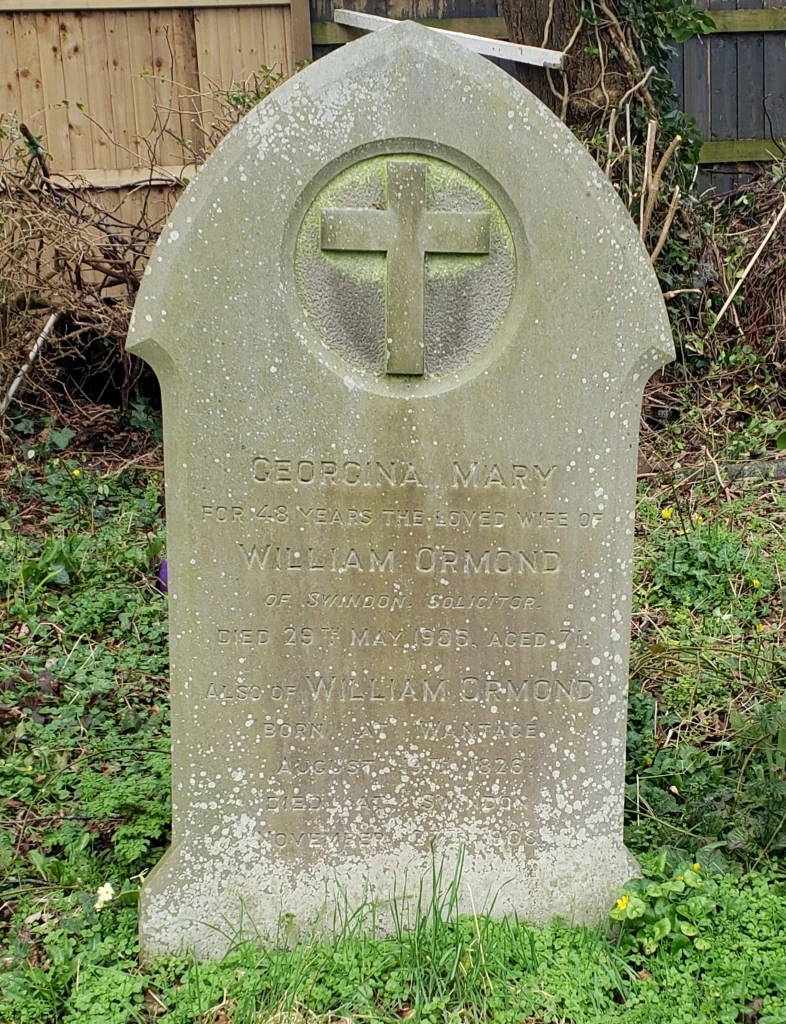William Ormond, a solicitor, and his wife Georgina lived at a property called the Limes for more than 45 years. The road in which it stands has been variously known as Short Hedge, Horse Fair Street, Devizes Road and is now called Croft Road.

In the late 1880s Marion Ormond was at the centre of the scandalous case of the Christ Church vicar Rev. Newton Ebenezer Howe. Marion 23, one of Georgina and William Ormond’s large family (seven daughters and a son) was a Sunday School teacher and a district visitor.
Rev. Howe, a married man with a young son, arrived in Swindon to take up the post of vicar at Christ Church in 1887. Trouble began almost immediately. In 1889 there was a mishandling of money for the various Church and National School charities of which he was a trustee. Then came the accusations of misconduct involving a church volunteer, Marion Ormond.
The accusations against Howe intensified, yet despite all this Marion continued to visit the vicar and his wife, until eventually it was just the Vicar she was seeing. They began to meet in secret but they had been spotted.
On June 21, 1890 a notice of inhibition (an inquiry into the conduct of the vicar) was served on Howe while the matter was investigated.
For three consecutive evenings protesters gathered outside the vicarage, shouting and throwing missiles. Of course, Howe had made sure he was out of town and Marion had also left Swindon and was staying in Reading.
A public inquiry took place at the town hall in Old Swindon on August 15, 1890 where Howe was charged with adultery and improper behaviour. The hearing took place in a packed courtroom and lasted 5 hours. Marion was called to give evidence during which she became very distressed and had to leave the courtroom to compose herself. Her letter to the court defending Howe was read out.
Following the hearing Georgina submitted a letter to the local press in support of her daughter.
The following letter has been addressed to the Editor of the Devizes and Wilts Advertiser by Mrs Georgina Mary Ormond:
Sir, – In the absence of a word in favour of my daughter Marion in Mr Bucknill’s address to the Commission of Friday the 15th inst I hope you will allow me space in your paper to state in justice to her that she is not the immodest girl she may have appeared. Her visits to the Vicarage were always made to Mrs Howe, by whom, against her parents’ expressed wishes, they were deliberately encouraged, as well as her visits to Mr. Howe at the Vestry room, and the girl’s disobedience no doubt paved the way for all that followed. Mr. Howe represented himself as a cruelly persecuted man, and my daughter believed it her duty to cheer and defend him, trusting him entirely, and utterly unsuspicious of evil in his attentions to her.
The letter read in Court was written impulsively in the hope of freeing Mr. and Mrs. Howe from the imputation circulated against him. In order to make some reparation to her family for the disgrace she has brought on them, and to atone in some measure for her deceit and disobedience, she wished to tell all at the enquiry, and did her best, but the sight of Mr. Howe’s face with its agonised expression (which she saw whenever she looked at the counsel addressing her) so unnerved her that it is hardly to be wondered at if at the moment she failed to give the concluding details of her evidence. Moreover, she had good reason to believe that that part of her evidence would be allowed to be given in writing. In the hope that your readers may see in these details some extenuation of my daughter’s fault, I have troubled you with them.
Devizes and Wilts Advertiser, August 28, 1890.
The case was referred to a Consistorial Court at the Chapter House of Bristol Cathedral where on December 12, 1890 Howe pleaded guilty to all the charges. The Bishop suspended Howe from all duties for 3 years and he had to pay the costs of the hearing.
But amazingly this wasn’t the end of the Rev. Howe. In late 1893 he returned to Swindon where he began another affair and moved Miss Mary Roskyll into the vicarage. He was delivered with a second notice of inhibition and eventually served a 12 month prison sentence with hard labour.

Marion’s last address was the Old Haslings Hotel, Warninglid, Sussex. She died on February 25, 1942 at the Haywards Heath Hospital.
Her mother Georgina died at her home on May 29, 1906 and was buried in Radnor Street Cemetery in plot E8626 on June 1. William Ormond was buried in the same plot following his death two years later.
The Ormond family were very prominent solicitors in Wantage, in the 18th & 19th century . They
had a large house in the town centre, and today we have Ormond Road . Are they one and the same family?
LikeLike
Hi Neil – thank you for the comment. An interesting question. I wonder if any readers can confirm.
LikeLike